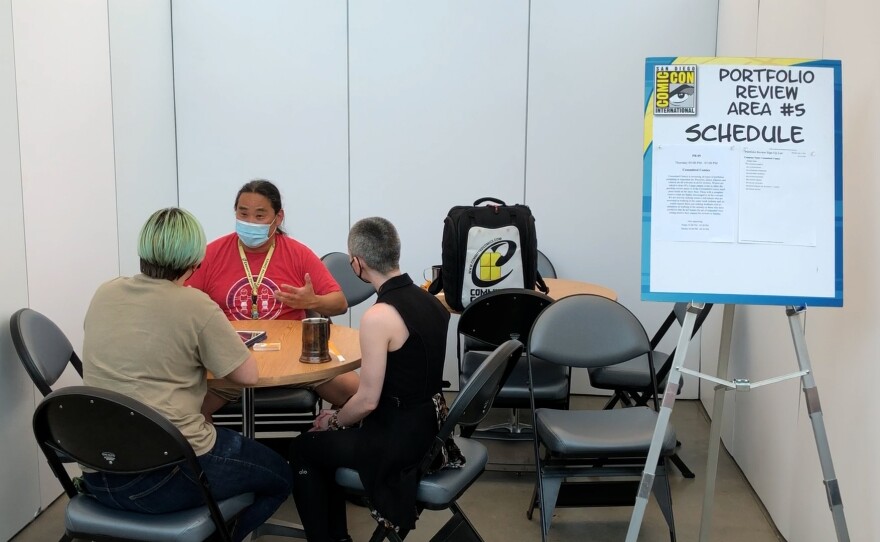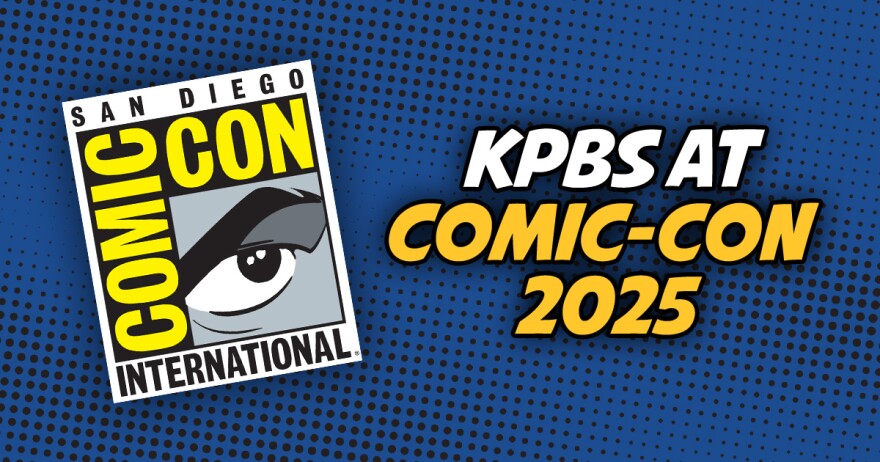Although Comic-Con ended on Sunday, some attendees will be busy this week following up on contacts they made during portfolio reviews at the convention.
Comic-Con attracts tens of thousands of pop culture fans who want to attend panels, shop for collectibles and cosplay. But it is also a place where deals are being made and artists network to advance their careers.
Sandy King Carpenter runs Storm King Comics, which had a booth on the exhibit floor. The booth looked like a casual office with big black arm chairs and a coffee table, and there's a reason for that.
"The other side of Comic-Con that maybe the fans don't realize is the publishers are here to do business. We're hiring people, and our writers setting up our stories and stuff for the next year. We're also talking to our distributors, and we're doing our other deals here. I'm having business meetings here all day long without having to leave the floor so I can still sign books for the fans and be available for my meetings in a comfortable environment where you're looking at presentations, you're talking about digital distribution, you're talking about what's the new wave and looking at different formats. You want to be ahead of the game, not behind it. And that all takes place at Comic-Con, so welcome to my office," Carpenter said.
Tom Doherty, the editor-in-chief, publisher and owner of Committed Comics, said Comic-Con afforded him a chance to meet artists in person at portfolio reviews.

Comic-Con had a special portfolio review area set up in the Sails Pavilion for professionals such as Doherty to sit down with artists and spend sometimes 30 minutes looking through their work and offering suggestions about how to improve or where to look for jobs.
"For me as a publisher, portfolio reviews open up the ability to see more than what can be put in front of me digitally," Doherty said. "It's really nice to actually be able to connect with somebody face-to-face and actually look at their stuff physically and point out different things about the artwork that might work in a storytelling capacity or just whatever different facets they actually have in their portfolio."
And sometimes it's more than just a review session.
"For Committed Comics, we've hired a tremendous amount of people from doing portfolio reviews here at Comic-Con," Doherty said. "Some of them have gone on to be quite successful in the comic industry, which I have no doubt they would have made it there regardless because they're exceptionally talented people. But it is nice that it's like: 'Oh yeah, I had my fingers on that art.'"

Julian Aguilera is a penciller, inker and colorist.
"The penciller draws the actual drawing on a piece of paper, and then the inker goes over the person's pencils, and then the colorist actually adds color to the whole piece. So it's kind of like an assembly-line process," Aguilera said.
Aguilera, who has done portfolio reviews in the past, was waiting for portfolio reviews with multiple companies at Comic-Con.
"If you're looking for either work or even criticism, if you're looking to improve, it's probably the best way to do it. If you find an editor that likes your work, then there's a good possibility of you actually getting work. And if there isn't an editor that likes your work but likes maybe the way you color or how you ink, then it actually helps out to have a pretty well-rounded view of your work. So I've gained some work and then also gained a lot of pointers on how to do, like, how to improve my artwork," Aguilera said.

Maximus Spragovsky was also waiting for portfolio reviews. One of the things he does as a business is turn regular people into superheroes. At one portfolio review, a publisher suggested making a coffee-table book out of the photos and the custom art.

Spragovsky returned this year for another portfolio review.
"I like to see how I grow as an artist because each year my style grows from the comic book to more realistic. So it's nice to see the evaluation from professionals to get their perspective on my work," Spragovsky said.
Hank Kanalz is the publisher at San Diego-based Clover Press. He looked at work by both Spragovsky and Aguilera.
"It's a way to see what the talent pool is like out there. It's a great opportunity to meet new artists, new talent. You never know if you're going to find your next new artist. And this is a great way to network and communicate with potential publishers and editors," Kanalz said.

Twenty years ago, portfolio reviews at Comic-Con were even more valuable because it was one of the only ways to get your art in front of the eyes of a publisher without traveling to their offices. Now artists can easily submit work digitally. But Kanalz likes the in-person connection combined with the digital one.
"People can email in between those shows," Kanalz said. "That's been a way to accelerate the process of finding new talent. But nothing beats the grassroots meeting and greeting of potential new artists. So it's nice to get feedback in person from another human being that can tell you the areas that you should work on and focus on and also tell you what you're doing right, because it's not just about being told what to fix: It's also being told what you're doing right and what to do more of."
The process can be extremely helpful to artists if they are open to what the pros are telling them.
"If you go downstairs and talk to some of the largest comic book artists, they'll tell you right away: 'I don't know everything. I'm still learning, too.' And anytime an artist has stopped learning, then they plateaued and they're not going to excel anymore," Doherty said. "The good ones are very open to criticism. At the same time, though, when I look at a portfolio, I'm not going to sit there and be like, 'that's terrible' and 'that's wrong.' That doesn't do them any good, either, if I'm just mean to them and kill their dream."

But sometimes hearing criticism is difficult.
"In this business, you have to have a very thick skin," Aguilera said. "Some people are going to be bluntly honest with you. And then some people might actually sugarcoat it if you're at that level. It's best just to take notes and then come back next year and just keep trying to improve."
Spragovsky chimed in: "Good constructive criticism is a great way to learn. He [Kanalz] evaluated my work. It was great. He complimented me on it, and that was a big praise. He also gave me a great advice, basically making my characters to stand out compared to the background, so my characters can pop. So it's pretty awesome."

Alston Novak and Sarah Landauer brought the first pages of their comic "Glitch" to get feedback from Doherty.
"It's a project that Sarah does the writing for, I do the art for, and we just kind of sat and got some feedback on what was working out, what needs some improvement, and just places we could do better in the future," Novak said. "It's really helpful to kind of get that insight and almost like being in a class, honestly, with a teacher who can give you feedback on: 'Here are the next things to work on if you want to improve.'"

Landauer added a different perspective.
"It helps me in the scripting process to kind of get a better handle on what goes into translating the words into a visual medium," Landauer said. "I think I gained a lot of insight into helping to make things a little more like dynamic and knowing what works with how much dialogue in writing should go on a page, how to distribute the action in a way per page to hopefully make the artist's and the letter's job easier from my end."
Doherty loves the fact that he never knows what he will get when someone opens their portfolio.
"I never know what's going to happen when the person sits down and they say: 'Here it is.' And they open it up and it's either a wonderful treasure trove of things, or I'm looking at it going, 'I'm very confused.' I want to gear (the review) towards what I'm looking for. I'm looking for somebody who is creatively driven. I was telling someone the other day down on the sales floor: 'If you are only going to create because someone's asking you to create, then I really don't want to work with you' — because for me this is totally a passion project so I need to make sure that the people I am working with have the same level of commitment and drive."
Aguilera ended his portfolio review with Doherty on a very positive note.
"He ended up liking something that wasn't on the pages that I brought," Aguilera said. "He wanted something of my personal work (a horror comic in the works). So I'm going to be sending him a treatment of what I did and hopefully we'll take it from there. So I just try to improve. That's the most important thing. And following up with everyone that you talk to."












